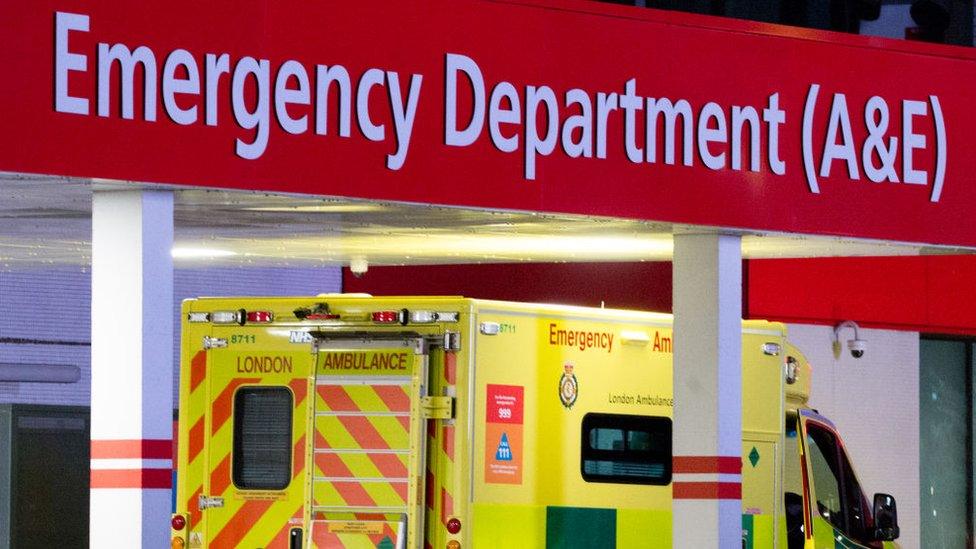Ambulance wait times endangering patients, doctors say
- Published
Watch: Injured 10-year-old told ambulance would take hours
Doctors and paramedics have told the BBC that long waits for ambulances across the UK are having a "dangerous impact" on patient safety.
BBC analysis found a 77% rise in the most serious safety incidents logged by paramedics in England over the past year, compared to before the pandemic.
In Wales, Scotland and Northern Ireland, the 999 system is also under "tremendous pressure", doctors say.
NHS England said the safety of patients is its "absolute priority".
'Help should have been there'
In October, nine-year-old Willow Clark fell off her bike on a country path in Hertfordshire, cracking her helmet and leaving her with a fractured skull and a nine-inch laceration across her leg.
"I could see it was a really bad accident and I was 20 minutes away from home screaming for help," said her mother Sam. "These really nice people who were passing by phoned 999.
"They explained she had a severe head injury and her leg was badly hurt but we were told it would be a 10-hour wait for an ambulance and we'd have to get her to hospital ourselves."
Sam's husband had to drive through a farmer's field to pick up his daughter.
When they got to A&E, Willow was immediately transferred to the trauma department. Doctors told her family that she should not have been moved because of her back and neck injuries.
"It's the first time I've ever had to phone an ambulance and I was so disappointed," said Sam. "When we really needed it, help just wasn't there and it should have been."
She later found out that Willow had been classified as an "urgent" category three case, meaning an ambulance should have arrived within 120 minutes.
East of England Ambulance Service said it was under "significant pressure" that day because of a high number of 999 calls and was asking some patients to make their own way to hospital.
It has apologised, and said Willow - now 10 - should have been dealt with as a more critical category two case.

Samantha's daughter Willow is still in some pain and has problems with her sight after her accident in October
Willow's experience, although traumatic for her family, was not recorded as a serious safety incident by the NHS.
To reach that threshold, an incident must have potentially led to long-term harm or death.
BBC research shows there were 551 serious safety reports filed by ambulance staff in England between March 2021 and February 2022, up from 312 in the same period before the pandemic.
Within that data, there were 201 unintended or unexpected deaths, up from 78 in 2019/20.
The data does depend on staff deciding to report problems, and not all serious incidents will be linked to long ambulance delays. The largest proportion though do relate to the 'access, admission or transfer' of patients.
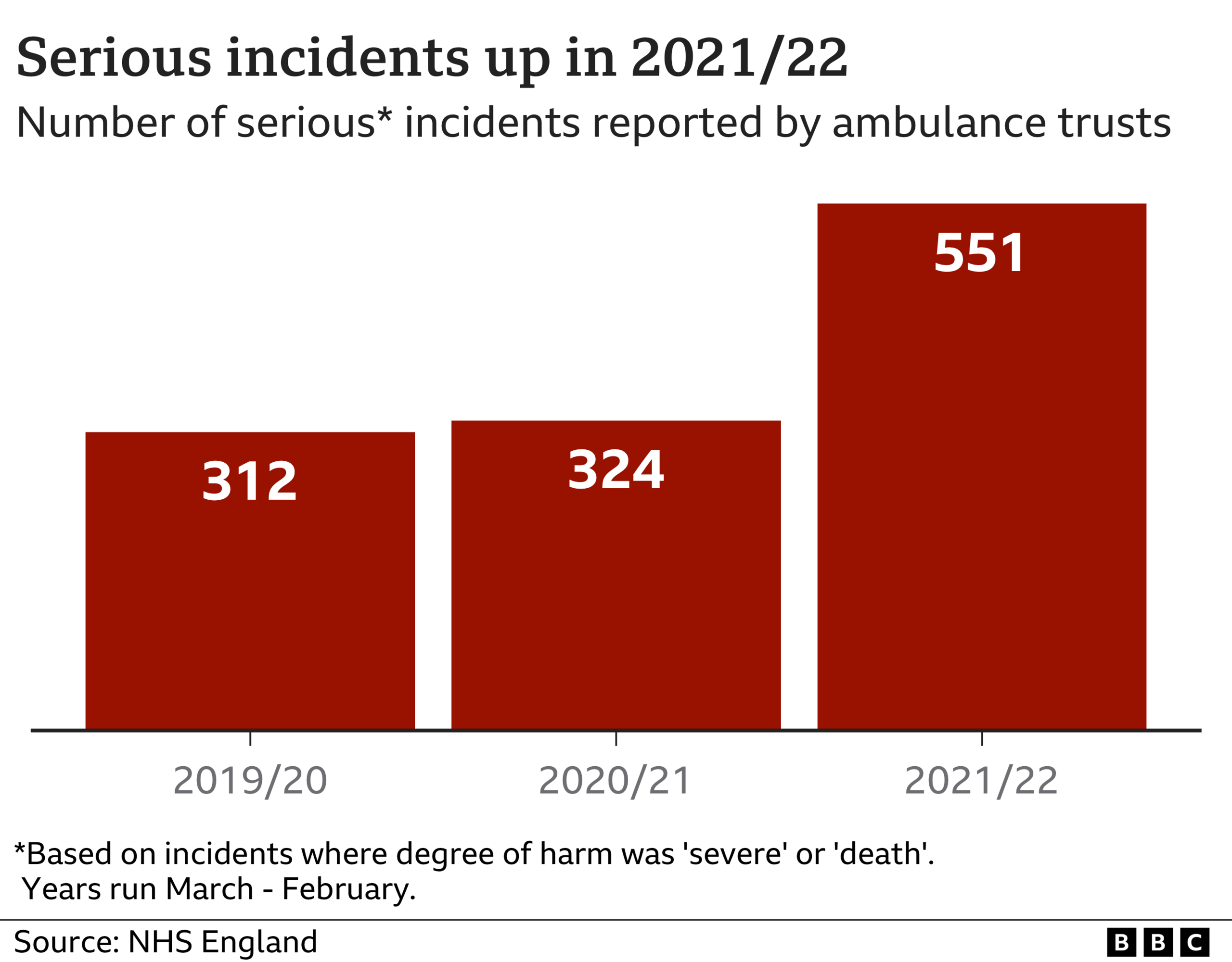
Coroners and lawyers have highlighted recent cases including:
Staffordshire's assistant coroner issued a 'prevention of future deaths' warning, external after a patient in Stoke died after waiting eight hours for an ambulance
The family of a man who died after waiting nine hours for treatment has issued a legal challenge against the Northern Ireland Ambulance Service over a "chronic shortage" of ambulances
The London Ambulance service is investigating after a man died when paramedics took almost 70 minutes to respond to a suspected heart attack
Dr Katherine Henderson, an A&E consultant and president of the Royal College of Emergency Medicine, told the BBC's Today programme the problem with ambulance waits was "more serious than we've ever seen it".
She said: "We've got big queues - we can't get flow out of our departments. The underlying reason is that emergency departments are absolutely packed."
Dr Henderson explained the bottleneck was caused by emergency departments having to wait to move patients into wards.
Lengthy response times
All 10 of England's major ambulance trusts have raised their internal alert level to a point indicating they are under severe or extreme pressure, research for the BBC has found.
The latest data from NHS England shows that response times are now at their highest since the current system was introduced five years ago.

In April, crews were responding to a "life-threatening" callout in nine minutes and two seconds on average, significantly above the seven-minute national target.
The response time for a category two emergency, such as a heart attack or a stroke, has risen to more than 51 minutes, almost three times longer than the 18-minute target.
One paramedic, who often works as a clinical call handler, told the BBC: "Sitting staring at a screen with over 400 people waiting for an ambulance is soul-destroying.
"Do the delays mean people are dying? Absolutely, but we also need to be educating people on when someone really needs an ambulance."
She said that on one recent shift, the longest wait for a category two emergency was more than 15 hours, for an elderly man with abdominal pain.
The patient hadn't phoned again overnight and no welfare calls had taken place. When the crew arrived the next morning, they found the man dead.

There are different factors behind the long waiting times.
The ambulance service is seeing record levels of demand this year, as Covid restrictions have been lifted.
More than 860,000 calls to 999 were answered in England in April, 20% higher than in the same month in 2019.
There is a national shortage of paramedics across the UK, and Covid has still been causing disruption - with higher levels of staff sickness over the winter.
Crucially though, ambulance crews themselves have faced long delays when they pick up patients and then try to deliver them to hospital staff in a busy emergency department.
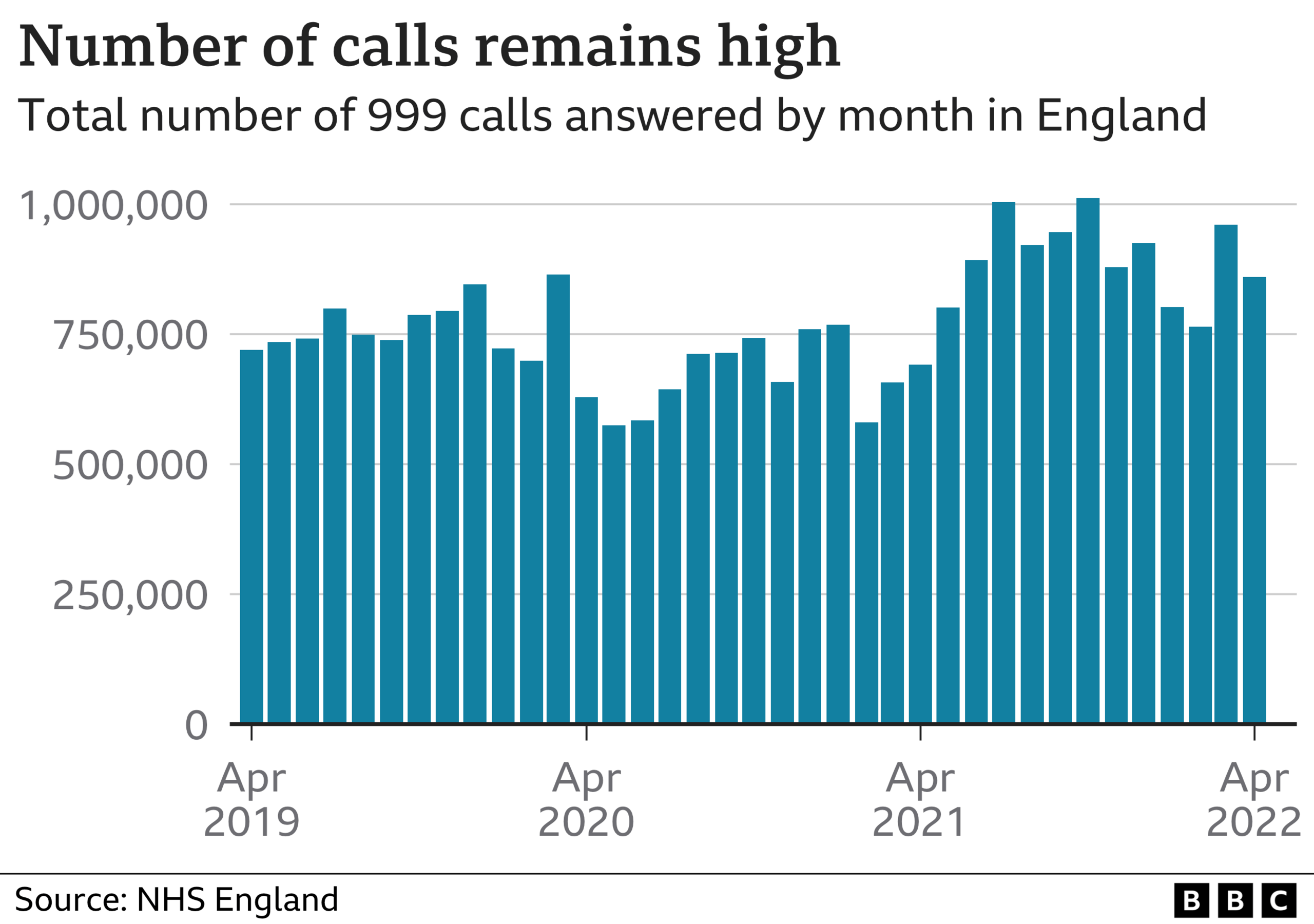
In the first week of April, around one in ten patients had to wait more than an hour for their ambulance to be unloaded in England, far higher than the same week last year, and well above the 15-minute NHS target.
Another paramedic told the BBC that those kinds of waits were having a 'dangerous impact' on patient safety.
"We are doing the job to provide emergency care and to save lives, but actually now we are just an extended ward of the hospital," he said.
"I'm meant to care for a patient who had been in the back of my ambulance for 14 hours, but nobody has ever really taught me how to look after someone like that."
The Association of Ambulance Chief Executives (AACE), which represents services across the whole UK, says handover delays cut the number of hours crews could operate by "up to one-third" in some areas in March.
"The potential harm... could be impacting thousands of patients every month, with obvious knock-on effects on the morale and wellbeing of staff," managing director Martin Flaherty said.
"Every possible effort is being made to prioritise those patients whose conditions are most serious.
"Sadly, given the loss of capacity associated with handover delays, this is simply not always possible to achieve."
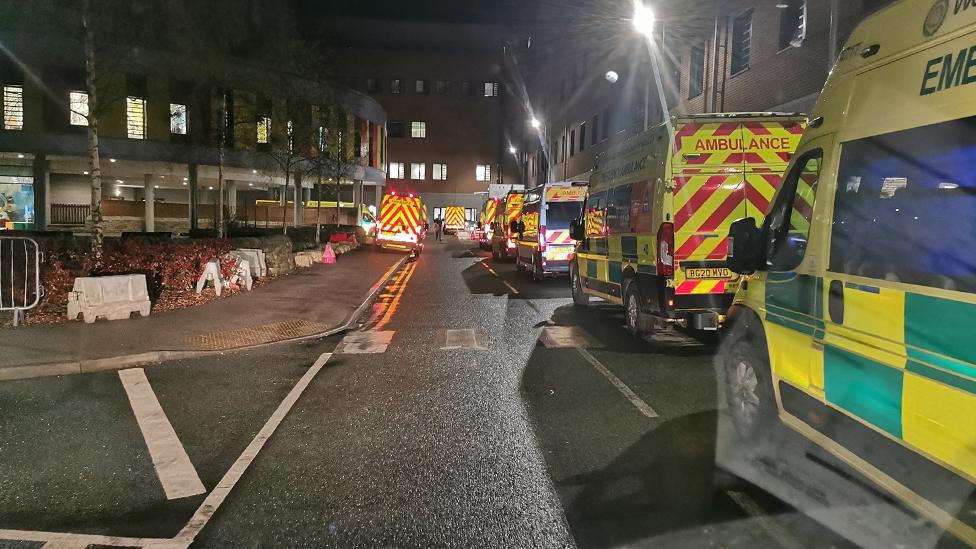
Ambulances waiting outside Royal Stoke University Hospital on 12 April, 2022
BBC News has spoken to patients in Scotland, Wales and Northern Ireland who have experienced similarly long waits:
Last week, one in 10 ambulances across Scotland took more than 80 minutes to drop patients at an emergency department
Welsh Ambulance Service figures show just 51% of immediately life-threatening calls were reached within the target time of eight minutes in March, well below the 65% target
In Northern Ireland, ambulance delays could have contributed to 14 deaths in the past year, the service's chief executive told BBC News
An NHS England official said it was working closely with ambulance trusts and care homes to free up more capacity in accident and emergency departments.
"The safety of patients is our absolute priority and it is a good thing that more staff are being encouraged to report all incidents to help prevent repetition," she said.
"There's no doubt the last few months have been some of the toughest ever for NHS staff, with ambulances responding to the highest number of 999 calls on record over the past year, while more than a 10th of all hospital beds have been filled by people fit to be discharged to services such as social-care providers."
A Department of Health and Social Care spokesperson in England said "a record £36bn" from the health and social care levy was being provided over the next three years for the NHS and social care.
There is also a plan to tackle the Covid backlog, and additional funding this year to support increased NHS 111 capacity in taking calls, to ensure people only visit A&E when necessary.
"We recognise the unprecedented pressure NHS staff are under from the pandemic - especially frontline ambulance workers," the spokesperson said.
Additional reporting by Victoria Park-Froud.

Have you experienced a long delay, either waiting for an ambulance or at A&E? Email haveyoursay@bbc.co.uk, external.
Please include a contact number if you are willing to speak to a BBC journalist. You can also get in touch in the following ways:
WhatsApp: +44 7756 165803
Tweet: @BBC_HaveYourSay, external
Please read our terms & conditions and privacy policy
If you are reading this page and can't see the form you will need to visit the mobile version of the BBC website to submit your question or comment or you can email us at HaveYourSay@bbc.co.uk, external. Please include your name, age and location with any submission.
Related topics
- Published11 May 2022
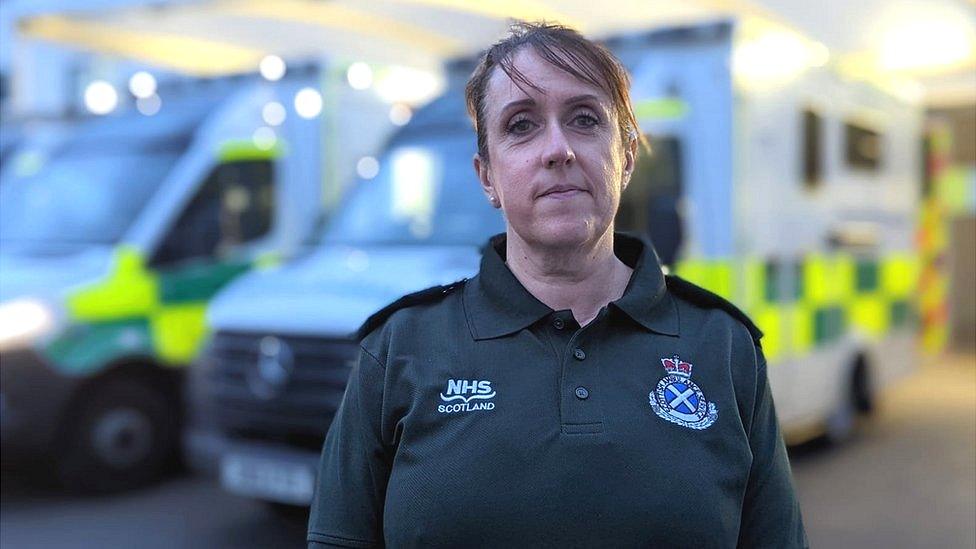
- Published6 May 2022
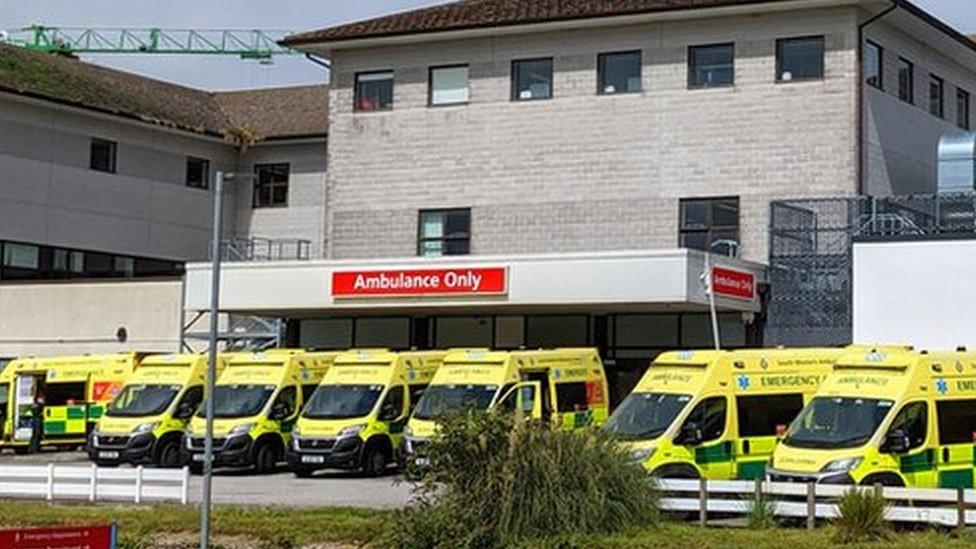
- Published28 April 2022

- Published18 April 2022
